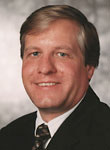Emr reappointed as Weill Institute director
By Krishna Ramanujan

Scott Emr has been reappointed to a five-year term as director of the Weill Institute for Cell and Molecular Biology, announced Robert Buhrman, Cornell's senior vice provost for research. Emr's new term began July 1, 2012.
"Scott's leadership both as a scientist and director has enabled us to recruit a remarkable cadre of young faculty to the institute, to enrich the Cornell life sciences research environment beyond the institute and help it achieve greater visibility on both the national and international scenes," Buhrman said.
Throughout his first term, Emr kept the institute focused on hypothesis-driven science that uses genetics, biochemistry, proteomics and bioinformatics to answer fundamental questions in cell biology.
"The institute is on the map in the world of cell biology," said Emr. "No longer are people asking what is the Weill Institute. It's more about who have we hired and is there an opening for me."
The institute has nine faculty members: senior faculty members Emr and Anthony Bretscher, both professors in the Department of Molecular Biology and Genetics (MBG), and seven junior faculty members that hold assistant professor appointments in MBG, biological statistics and computational biology, biomedical engineering or plant biology. Plans call for hiring four more junior faculty members. Searches may start this fall for two of the new hires, one with a joint appointment with the chemistry and chemical biology department and another with the molecular biology and genetics department.
Emr said the junior faculty are "rising stars in their areas of expertise." All told, the institute's faculty has published more than 50 papers in prominent journals in the last five years.
"These are the best of the best, and they are eager to make names for themselves," Emr added.
Almost all of the junior faculty members have grant support from the National Institutes of Health or the National Science Foundation, which is no small feat when considering that grants are extremely competitive and only 10-12 percent of applicants receive grants, he said.
This summer the Weill Institute selected Michael Lukey as its fifth Nancy M. and Samuel C. Fleming Research Fellow. The fellowship program, established in 2008 to support talented young researchers doing innovative work in basic biomedical sciences, offers three years of salary and research support to Lukey, a University of Oxford Ph.D. Lukey moved to Cornell in 2010 as a postdoctoral associate in the lab of Professor Richard Cerione, who holds joint appointments in molecular medicine and in chemistry and chemical biology. Lukey plans to study the fundamental mechanisms that control cell growth as they relate to cell signaling and cancer.
"The most exciting thing about running the institute is the day-to-day interactions I have with eager young scientists trying to solve important problems," said Emr.
Emr earned a Ph.D. in microbiology and molecular genetics at Harvard University in 1981. Prior to joining the Cornell faculty, he was a distinguished professor of cellular and molecular medicine at the University of California-San Diego School of Medicine and an investigator of the Howard Hughes Medical Institute.
Emr is a member of the American Academy of Arts and Sciences and the National Academy of Sciences, a fellow of the American Association for the Advancement of Science and a foreign member of the European Molecular Biology Organization.
Media Contact
Get Cornell news delivered right to your inbox.
Subscribe